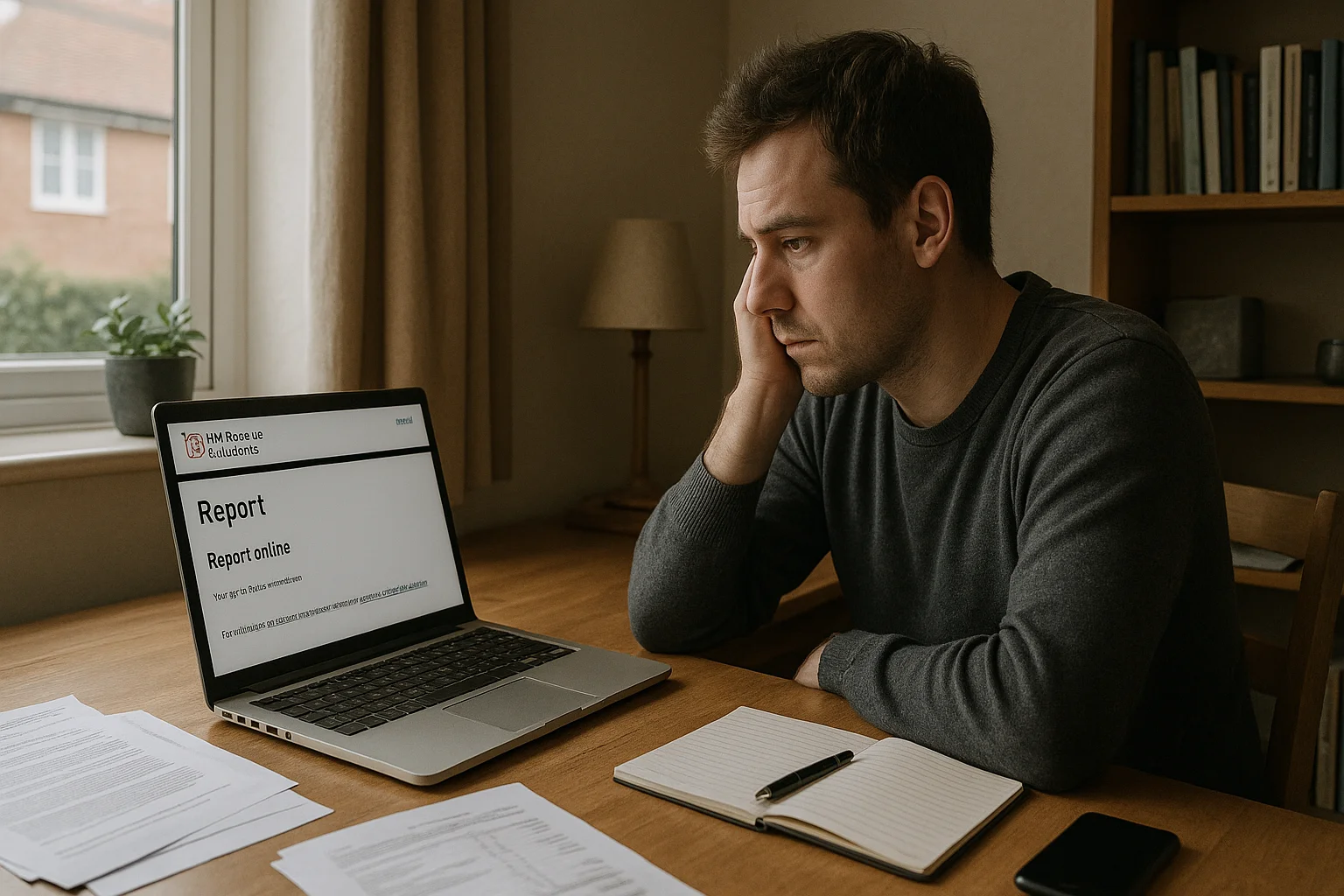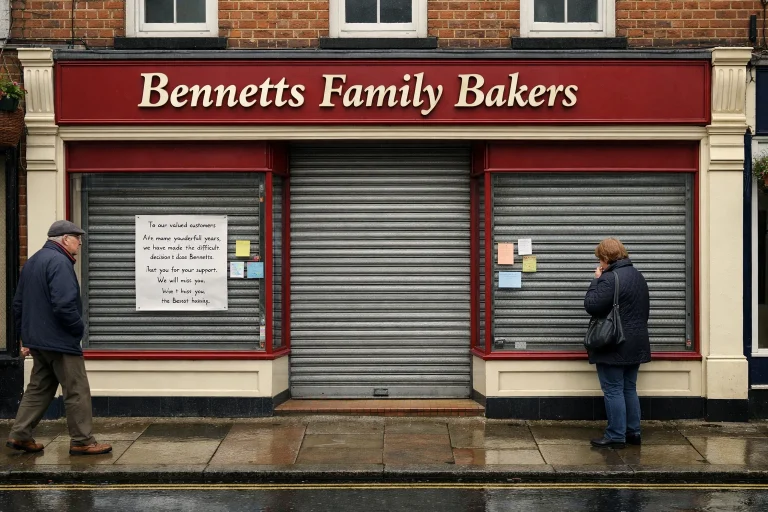Ever found yourself questioning whether a person or business is paying their fair share of tax? It’s a situation that many UK residents encounter, whether it’s noticing unusually large cash payments at a local business or hearing about someone working multiple jobs while still claiming benefits.
For one resident, a simple suspicion about their neighbour’s lavish lifestyle without any visible income source prompted a step most would hesitate to take, reporting the case to HMRC. But what actually happens when someone makes that call or fills in the online form?
This blog explores the full process, from reporting tax fraud or evasion to what HMRC does with the information. It’s important to understand your role as a whistleblower, the investigative steps HMRC follows, and the implications for the person or business being reported.
Why Would Someone Report a Person or Business to HMRC?

Reporting someone to HMRC usually stems from suspicions about dishonest financial activity, particularly if it impacts public resources. HMRC encourages reports from individuals who have information or concerns about a person or business failing to meet their tax responsibilities.
Common Reasons to Report
- Deliberate tax evasion or avoidance
- Claiming tax credits or the Child Benefit fraudulently
- Hiding assets, cash, or cryptocurrency to avoid tax
- Using illicit fuel, tobacco, or alcohol
- Smuggling goods, including precious metals or sanctioned items
- Operating without a trading licence
While it may seem intimidating, reporting is a civic duty that protects the fairness of the UK tax system. Anyone in the UK can file a report, and in most cases, this can be done anonymously.
How Can You Report Tax Fraud or Avoidance to HMRC?
The process of reporting someone to HMRC is straightforward. You can use the online form or telephone hotline depending on your preference or access.
Reporting Options
| Method | Details |
|---|---|
| Online Form | Fill in on the HMRC website. Anonymous submissions accepted. |
| HMRC Fraud Hotline | Call 0800 788 887 (UK) or +44 203 080 0871 (outside UK). |
| Availability | Monday to Friday, 9am to 5pm (except bank holidays). |
Things to Remember
- You do not need to give your personal details, but you can choose to.
- Do not send supporting documents initially. Mention them in your report if necessary.
- For your safety, do not try to investigate further or inform the person you’re reporting.
- If you’re reporting tax avoidance schemes, HMRC encourages the use of a specific code: TAC.
By using the correct reporting channel, your information is routed directly to HMRC’s fraud teams for review.
What Happens When You Report Someone to HMRC?

Once HMRC receives a report, it goes through a systematic process. They assess whether the tip-off provides enough evidence or grounds to start a compliance check or a full investigation.
What HMRC Does with a Report?
1. Initial Assessment
- Checks whether the claim is credible and relevant to HMRC’s remit.
- Gathers any other information from existing HMRC records.
2. Internal Routing
If valid, it’s passed to the appropriate team such as Fraud Investigation Service (FIS) or a regional compliance team.
3. Action Planning
- HMRC may initiate a civil investigation under Code of Practice 8.
- In more serious cases, they may escalate it to Code of Practice 9 or even start a criminal investigation.
Confidentiality and protection
HMRC follows strict GDPR and Data Protection rules. Whistleblowers’ identities are kept confidential unless legally required to be disclosed, which is rare.
Can HMRC Trace the Reporter?
Many people hesitate to report someone to HMRC out of fear that their identity will be exposed. HMRC explicitly states that reports can be made anonymously and that personal details are never required.
If you do choose to provide your name and contact information, it helps HMRC to:
- Contact you for clarification or additional details
- Provide updates if necessary (though they are not required to do so)
Still, the process is designed with whistleblower protection in mind. If you’re unsure about providing personal details, anonymity is perfectly acceptable and still effective.
What is HMRC’s Fraud Investigation Process Like?
HMRC uses two primary investigation routes depending on the case severity:
Code of Practice 8 (COP8)
COP8 is used when HMRC suspects someone is trying to pay less tax through deliberate but non-criminal methods. These are usually complex cases involving:
- Tax avoidance schemes
- Suspicious offshore arrangements
- Inaccurate disclosures
This is a civil investigation, not intended for criminal prosecution, unless fraud is discovered during the process.
Code of Practice 9 (COP9)
Used when HMRC suspects serious fraud. This may lead to:
- Criminal prosecution
- Interviews under caution
- Seizure of assets
In both cases, HMRC works with the taxpayer or their adviser, gathers evidence, and examines financial records. They may also use their legal powers to compel third parties to provide information.
How Long Does an HMRC Investigation Usually Take?

The duration of an investigation varies widely based on complexity, co-operation, and the amount of information to review.
| Investigation Type | Estimated Duration |
|---|---|
| COP8 | 6 months to 2 years |
| COP9 | 12 months or more |
| Compliance Checks | Weeks to several months |
Factors That Influence Timing
- Willingness of the person or business to cooperate
- Availability of financial records
- Legal complexity or overseas links
- Whether the report involves criminal suspicion
HMRC may update the person being investigated during the process, but for those who reported, no follow-ups are typically provided due to confidentiality.
What Can HMRC Do Once They Start Investigating?
Once an investigation starts, HMRC has broad powers under UK tax law. They are authorised to:
HMRC Investigation Powers
- Request financial records
- Conduct interviews with the person involved
- Visit business premises with prior notice
- Use open-source intelligence like social media and Companies House
- Impose penalties for non-compliance or false information
HMRC can visit:
- Your home (only if invited or necessary)
- Business premises
- Adviser’s office
- HMRC office
They document all meetings and may request a signed copy of minutes. While not mandatory, signing reflects agreement with the record.
What Are the Consequences for the Person or Business Reported?

The consequences depend on the severity of the misconduct and the findings from the investigation.
Possible Outcomes
| Misconduct Found | Action Taken |
|---|---|
| Minor errors | Adjustments, interest charges |
| Deliberate errors | Financial penalties, publication of details |
| Serious fraud | Criminal prosecution, imprisonment |
Penalties May Include
- Interest on unpaid tax
- Fixed or percentage-based fines
- Publication as a “deliberate defaulter”
- Temporary restrictions on trading
HMRC calculates penalties based on cooperation, time of disclosure, and honesty. Early and full disclosure may reduce penalties significantly.
Can Someone Be Falsely Accused or Mistakenly Investigated?
HMRC takes great care to ensure investigations are based on credible evidence. However, mistakes can occur. To prevent wrongful accusations:
- HMRC cross-checks reported data with their records
- They conduct preliminary checks before launching a full investigation
- All individuals have a right to appeal decisions
If an investigation finds no wrongdoing, HMRC will close the case and notify the subject.
If Wrongly Investigated
- The subject can request a formal review
- They may appeal to a tax tribunal
- They can lodge a complaint about the HMRC process
The system includes multiple safeguards to protect innocent individuals and businesses from reputational or financial damage due to false reports.
How HMRC Helped Someone Escape a Tax Avoidance Trap?

Duncan, an IT project manager, started working through what appeared to be a reputable umbrella company. At first, the pay seemed unusually high, and he noticed discrepancies between his payslip and bank account deposits.
Upon checking further, Duncan discovered the company was operating a tax avoidance scheme. The payments made into his account were artificially structured as loans to avoid tax deductions.
He reported the issue to HMRC and received guidance to settle the unpaid taxes. Duncan was also able to set up an instalment plan. While he still had to pay back the taxes and interest, his full cooperation prevented further penalties or prosecution.
This case highlights the importance of being vigilant and proactive, even if you’re unknowingly involved in a tax scheme.
How Can Someone Avoid Being Reported to HMRC?
The best way to avoid being reported is by staying compliant and transparent in all financial and tax-related dealings. Understanding your obligations and keeping clear records can significantly reduce the risk.
Tips to Stay Compliant
- Submit accurate returns on time
- Check payslips against actual payments
- Avoid schemes that promise unusually high take-home pay
- Keep proper business records
- Declare all sources of income
Risk Indicators of a Tax Avoidance Scheme
| Indicator | Risk Level |
|---|---|
| Payments not matching payslips | High |
| Income received as loans or capital | High |
| No tax deducted at source | High |
| Complex offshore arrangements | Moderate |
If unsure about your arrangements, speak to a tax professional or check HMRC’s published list of known tax avoidance schemes.
Conclusion
Reporting someone to HMRC is not a decision made lightly, but it plays a crucial role in maintaining the fairness of the UK’s tax system.
Whether it’s an individual hiding income or a business operating through questionable practices, HMRC has clear procedures to handle reports, conduct investigations, and enforce compliance.
If you’re on the receiving end of a report or simply want to stay on the right side of tax law, transparency and good record-keeping are your best defences. And remember, it’s never too late to put things right with HMRC’s support.
FAQs
What happens if someone makes a false report to HMRC?
If a report is made in bad faith or with false information, HMRC may disregard it after their initial checks. They do not penalise reporters unless there’s malicious intent and harm.
Will HMRC contact the reporter after submitting a report?
Usually, no. Unless you provide contact details and permission, HMRC will not follow up with you after the report.
Can the person being reported find out who reported them?
No. HMRC protects the identity of all informants unless legally required to disclose it, which is extremely rare.
How can I report someone using an offshore tax avoidance scheme?
You can report through the HMRC online form or fraud hotline. Offshore schemes are treated seriously and may trigger a COP9 investigation.
What if I realise I’ve been involved in a tax avoidance scheme?
Contact HMRC as soon as possible. They will help you exit the scheme, calculate what you owe, and may allow you to pay in instalments.
Can HMRC investigate without telling the person?
Initial checks may be done without informing the subject. Formal investigations, however, usually come with written notice.
What is the difference between tax evasion and tax avoidance?
Tax evasion is illegal and involves deliberately hiding income. Tax avoidance uses legal loopholes, but HMRC may still challenge and penalise such schemes.
{
“@context”: “http://schema.org/”,
“@type”: “FAQPage”,
“mainEntity”: [
{
“@type”: “Question”,
“name”: “What happens if someone makes a false report to HMRC? “,
“acceptedAnswer”: {
“@type”: “Answer”,
“text”: “If a report is made in bad faith or with false information, HMRC may disregard it after their initial checks. They do not penalise reporters unless there’s malicious intent and harm.”
}
},
{
“@type”: “Question”,
“name”: “Will HMRC contact the reporter after submitting a report? “,
“acceptedAnswer”: {
“@type”: “Answer”,
“text”: “Usually, no. Unless you provide contact details and permission, HMRC will not follow up with you after the report.”
}
},
{
“@type”: “Question”,
“name”: “Can the person being reported find out who reported them? “,
“acceptedAnswer”: {
“@type”: “Answer”,
“text”: “No. HMRC protects the identity of all informants unless legally required to disclose it, which is extremely rare.”
}
},
{
“@type”: “Question”,
“name”: “How can I report someone using an offshore tax avoidance scheme? “,
“acceptedAnswer”: {
“@type”: “Answer”,
“text”: “You can report through the HMRC online form or fraud hotline. Offshore schemes are treated seriously and may trigger a COP9 investigation.”
}
},
{
“@type”: “Question”,
“name”: “What if I realise I’ve been involved in a tax avoidance scheme? “,
“acceptedAnswer”: {
“@type”: “Answer”,
“text”: “Contact HMRC as soon as possible. They will help you exit the scheme, calculate what you owe, and may allow you to pay in instalments.”
}
},
{
“@type”: “Question”,
“name”: “Can HMRC investigate without telling the person? “,
“acceptedAnswer”: {
“@type”: “Answer”,
“text”: “Initial checks may be done without informing the subject. Formal investigations, however, usually come with written notice.”
}
},
{
“@type”: “Question”,
“name”: “What is the difference between tax evasion and tax avoidance? “,
“acceptedAnswer”: {
“@type”: “Answer”,
“text”: “Tax evasion is illegal and involves deliberately hiding income. Tax avoidance uses legal loopholes, but HMRC may still challenge and penalise such schemes.”
}
}
]
}







